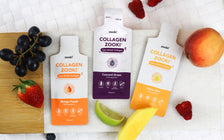Does Vitamin C increase energy levels?
One of the earliest and most obvious symptoms of Vitamin C deficiency is fatigue, both mental and physical, as well as lethargy and general lack of energy.
Vitamin C and energy production
Vitamin C is essential for energy production as it is involved in the synthesis of L-carnitine, an amino acid derivative that helps the body convert fatty acids, like Omega 3, into energy. This supports your metabolism and helps reduce fatigue and tiredness.
Vitamin C and stress hormones
Vitamin C is also a vital nutrient for your adrenal glands, which are responsible for regulating your body’s response to stress. In cases of chronic stress, your adrenal hormones can become imbalanced, leading to fatigue.
Since Vitamin C is required by your adrenal glands, they use up more Vitamin C the more stressed you are. If you are chronically stressed you'll require more Vitamin C than the average person and if you don't have enough it'll typically show in low energy levels.
Vitamin C and iron absorption
In addition, Vitamin C is needed to absorb iron from plant-based foods, which helps reduce fatigue and give you more energy. This is particularly important if you’re vegan or vegetarian!
Vitamin C as an antioxidant
One of Vitamin C’s many roles is as an antioxidant. This means it's able to mop up free radicals, which cause oxidative stress and inflammation in your body.
Oxidative stress is an imbalance of antioxidants and free radicals in the body. High levels of oxidative stress can be found in multiple organs, including the heart, pancreas, kidneys, brain and lungs, and if not kept in check, can cause damage.
This helps to reduce the overall burden and energy demands of stress on your body.
How to boost your energy levels with Vitamin C
As a water soluble vitamin, Vitamin C doesn’t stay in your body very long. In most cases, it's excreted within 24 hours. This means that it's absolutely necessary to get your Vitamin C from external dietary sources or supplementation on a daily basis.Vitamin C-rich foods
Vitamin C is present to some degree in most fruits and vegetables, however, some types of fresh produce have more Vitamin C than others. Contrary to popular belief, many fruits and vegetables contain more Vitamin C than oranges and other citrus fruits.
Foods that contain the most Vitamin C include: papaya, bell peppers, guava, Brussels sprouts, broccoli, oranges, strawberries, kiwi, pineapple and cantaloupe melon.
These foods are best eaten raw and soon after preparation as cooking and exposure to oxygen can reduce the Vitamin C content by about 25%.
Vitamin C supplements
Although it is possible to get enough Vitamin C from foods, our modern lifestyles make it difficult to consume the amount of fresh fruit and vegetables we need to prevent depletion. If you are very physically active, under high amounts of stress or even just exposed to outside air pollution on a daily basis, your body needs a Vitamin C increase.
One of the easiest ways to ensure you are getting enough Vitamin C to support all your body’s systems that require it is through supplementation.
References
- Free radicals, antioxidants in disease and health
- Vitamin C as an antioxidant
- Vitamin C and immune function
- Vitamin C-squalene bioconjugate promotes epidermal thickening and collagen production in human skin
- Effects of vitamin C on health
- Synthetic or food-derived vitamin C--are they equally bioavailable?
- Interaction of vitamin C and iron
- Vitamin C supplementation lowers serum low-density lipoprotein cholesterol and triglycerides




